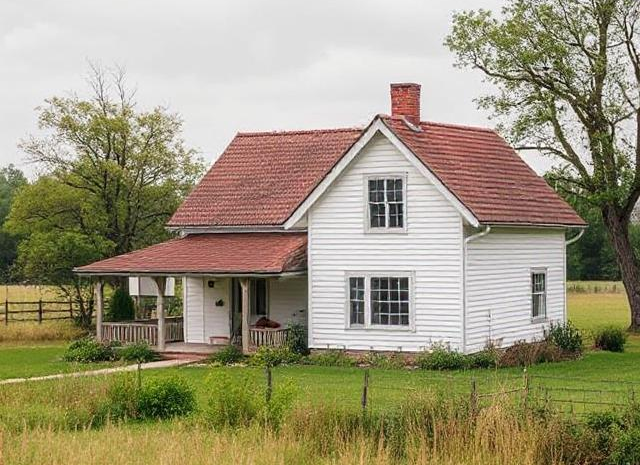
The Importance Of Home Insurance In Rural Areas
Home insurance is essential for homeowners everywhere, but it holds particular importance in rural areas for several reasons. While rural homes may face unique challenges, having the right coverage helps protect against risks and ensures financial security. Here’s why home insurance is especially important in rural areas:
1. Increased Risk of Natural Disasters
- Severe weather: Rural areas can be more prone to certain natural disasters like floods, wildfires, tornadoes, and hailstorms. These events can cause extensive damage to homes and property. For example, wildfires are more common in rural areas with dense vegetation, and tornadoes are prevalent in some rural regions. Home insurance can help cover the cost of repairs, rebuilding, or replacing lost belongings due to these types of disasters.
- Flooding: Even if you’re not near a body of water, rural areas are more susceptible to flooding from heavy rains or poor drainage systems. Standard homeowners insurance usually doesn’t cover flooding, so flood insurance may be necessary to protect your home in rural areas.
2. Longer Response Times for Emergency Services
- Emergency response times in rural areas can be slower due to longer distances between homes and the nearest fire department, police station, or hospital. If your home is damaged by fire or another emergency, delayed response times can increase the extent of the damage. Home insurance provides financial protection in the event that you need to repair or replace property due to an emergency.
- Fire protection: If you live in an area with limited access to fire departments or services, some insurers may offer discounts if you install a fire suppression system or water storage to protect your home from fire. It’s essential to discuss these possibilities with your insurer.
3. Higher Risk of Theft and Vandalism
- Isolation: Rural homes tend to be more isolated, which can increase the risk of theft or vandalism. Criminals may target homes in remote areas because they are less likely to be noticed. Home insurance can cover loss or damage from theft and vandalism, helping homeowners recover stolen property or repair damage.
- Installing security systems, motion lights, and cameras can lower the likelihood of theft and sometimes lower insurance premiums as well.
4. Difficult Access to Resources
- Limited resources: In rural areas, it may be harder to find contractors or repair services in a timely manner. If your home needs major repairs (e.g., after a storm or fire), the cost and time involved in getting repairs done can increase. Having home insurance helps offset these costs and allows you to rebuild your home or fix damage more quickly.
- It’s crucial to make sure your home insurance covers the specific needs of rural living, such as coverage for outbuildings or farm equipment that may be essential to your lifestyle.
5. Specialized Coverage for Rural Homes
- Agricultural and Farm Equipment: If you own a farm or rural property with significant agricultural equipment (tractors, plows, etc.), you may need additional coverage. Standard homeowners policies may not cover farm equipment or livestock, but adding farm insurance or a specialized rider can provide coverage for these unique needs.
- Outbuildings: Rural properties often have more outbuildings like barns, sheds, or workshops that may not be covered under standard home insurance. Ensure your policy includes coverage for these structures to avoid gaps in protection.
6. Protection Against Limited Services
- Rural areas may have fewer service providers for utilities like water, sewage, and power. This could lead to service interruptions or damages that may be outside of your control. If a tree falls on a power line or a storm knocks out power for an extended period, your home and belongings could be at risk. Home insurance can help cover power surge damage and other potential losses related to utility disruptions.
7. Higher Costs for Rebuilding and Repairs
- Rebuilding in rural areas: If your home is destroyed or significantly damaged, rebuilding in a rural area can sometimes be more expensive than in urban areas. The cost of materials, labor, and the delivery of supplies can be higher due to the distance from suppliers or the availability of skilled workers. Home insurance ensures you have the financial means to rebuild your home to its previous condition, even with these added costs.
8. Personal Liability Coverage
- In rural areas, you may be more likely to have large properties with areas that could pose risks, such as ponds, farming equipment, or livestock. Personal liability coverage is an important aspect of home insurance that protects you in case someone is injured on your property or you cause damage to others’ property (e.g., someone is hurt while visiting your farm or property). This coverage helps cover legal fees and medical costs if an accident occurs.
9. Financial Protection for Uncommon Events
- In rural areas, homes may be more vulnerable to certain uncommon risks (e.g., animal damage, falling trees, or landslides) due to the nature of the environment. Rural home insurance policies can often be customized to include special provisions for these types of risks, giving you peace of mind that you’re covered in case of an unexpected event.
10. Peace of Mind and Long-Term Security
- Owning a home is a significant investment, and having home insurance provides peace of mind. For homeowners in rural areas, where some risks may be more unpredictable, insurance is a critical safety net. It ensures that you can recover financially if disaster strikes, giving you the long-term security needed to protect your home, assets, and lifestyle.

